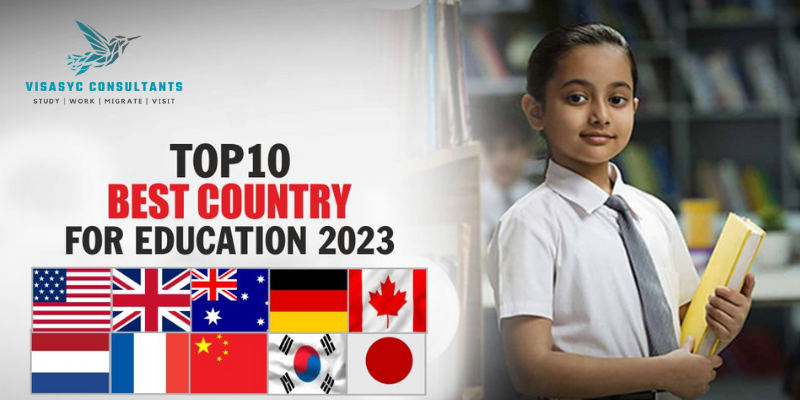Educational Prowess
Education has always been considered a crucial aspect of a country’s development and progress. It not only equips individuals with the necessary knowledge and skills but also plays a vital role in shaping the economy and society as a whole. With the rapid advancements in technology and globalization, the demand for a highly educated and skilled workforce has become even more imperative. As we enter the year 2023, it is interesting to take a look at the world’s top 10 most learned countries, based on various indicators of educational prowess. These countries have not only invested heavily in their education systems but have also consistently demonstrated excellence in producing highly educated individuals. Let’s dive into the rankings and see which countries are leading the way in educational excellence.
Methodology and Metrics Used in Determining the Rankings
Education is a complex field, and determining the rankings of the world’s most learned countries requires a comprehensive and systematic approach. In order to compile this list, we have considered a variety of factors and metrics that reflect the educational prowess of each country.
One of the primary indicators we have used is the literacy rate. Literacy is the foundation of education, and a high literacy rate signifies a strong educational system. We have also looked at enrollment rates at different education levels, including primary, secondary, and tertiary education. A high enrollment rate suggests accessibility and inclusivity in education.
Additionally, we have examined the quality of education provided in each country. This includes factors such as the number of highly ranked universities, research output, and international student satisfaction. The presence of world-renowned educational institutions demonstrates a commitment to excellence in education.
Moreover, we have considered investment in education. Government expenditure on education as a percentage of GDP and the availability of scholarships and grants indicate a country’s commitment to providing financial support for education.
Comprehensive Analysis of the Top 10 Most Learned Countries
Education has become a key determinant of a country’s progress and development in the 21st century. As we delve into the rankings of the world’s top 10 most learned countries, it is clear that these nations have made substantial investments in their education systems and have consistently demonstrated excellence in producing highly educated individuals.
The comprehensive analysis reveals some fascinating insights. Finland, for example, consistently ranks high in education due to its holistic approach and emphasis on early childhood education. Singapore’s education system stands out for its strong focus on STEM subjects and rigorous curriculum. Canada excels in higher education, with several globally recognized universities.
Denmark, known for its emphasis on critical thinking and problem-solving skills, continues to impress with its strong commitment to quality education. Sweden, on the other hand, boasts high literacy rates and strong gender equality in education.
Germany’s vocational education and training system stands out as one of the best, producing a highly skilled workforce. South Korea’s dedication to education and rigorous study habits have led to exceptional academic performance.
Netherlands, New Zealand, Switzerland, and Japan also feature in the top 10, each with their unique strengths and approaches to education.
These countries have become models for educational excellence, providing valuable insights and strategies for other nations seeking to enhance their education systems. By investing in education, prioritizing quality and inclusivity, and adapting to changing global learning trends, countries can pave the way for a brighter future and a highly educated population.
Distinguishing Factors: What Makes These Countries Stand Out?
As we explore the rankings of the world’s top 10 most learned countries, it is fascinating to uncover the distinguishing factors that set them apart from the rest. These countries have not only invested heavily in education but have also implemented unique strategies that have contributed to their educational prowess.
One common factor among these top-ranked countries is their emphasis on early childhood education. Finland, for example, places a strong focus on early childhood education, recognizing its significance in laying a strong foundation for lifelong learning. This holistic approach to education sets Finland apart and contributes to its consistently high ranking.
Another distinguishing factor is the strong commitment to quality education. Denmark, known for its emphasis on critical thinking and problem-solving skills, prioritizes the development of these skills among its students. Singapore’s rigorous curriculum and focus on STEM subjects ensure that students are well-prepared for future careers in these fields.
These countries also prioritize inclusivity in education. Sweden, for instance, has achieved high literacy rates and promotes strong gender equality in education, allowing all individuals to have equal access to education and opportunities.
Each of these top-ranked countries has its own unique strengths and approaches to education. By studying and adopting some of their strategies, other countries can also strive towards educational excellence and provide their citizens with the knowledge and skills needed for a brighter future.
Exploring the Education Systems of the Ranked Countries
As we dive deeper into the rankings of the world’s top 10 most learned countries, it is important to explore the unique education systems that have propelled them to the top. Each of these countries has developed its own approaches and strategies to prioritize education and ensure the success of its students.
Finland, for instance, has gained recognition for its holistic approach to education. Their education system focuses on early childhood education, recognizing that a strong foundation in the early years leads to better learning outcomes later in life. This approach has contributed to Finland consistently ranking high in educational prowess.
Denmark stands out for its emphasis on critical thinking and problem-solving skills. Their curriculum is designed to develop these skills among students, preparing them for the challenges of the future. Denmark’s commitment to quality education has made it a leader in educational excellence.
Singapore’s education system is renowned for its rigorous curriculum and strong focus on STEM subjects. The country has invested heavily in developing STEM-related programs and ensuring that students are well-prepared for future careers in these fields. This focus on practical and relevant skills has made Singapore a frontrunner in educational achievement.
How Did the Pandemic Impact Global Learning Trends?
The COVID-19 pandemic has had a profound impact on every aspect of our lives, and education is no exception. As schools and universities around the world were forced to close their doors and switch to online learning, global learning trends underwent a significant transformation. The pandemic served as a catalyst for the adoption of technology in education, accelerating the shift towards online learning platforms and digital resources.
One of the most notable impacts of the pandemic on global learning trends was the increased reliance on remote learning. As traditional classroom settings became inaccessible, students and educators had to quickly adapt to virtual classrooms and online lectures. This shift brought forth both challenges and opportunities. While some students struggled with limited internet access or lack of suitable learning environments, others embraced the flexibility and personalized learning opportunities that online platforms offered.
The pandemic also highlighted the importance of digital literacy and technological skills. As schools implemented online learning strategies, students were required to navigate digital tools and platforms, develop time management skills, and effectively communicate in virtual environments. These digital skills have become essential for future employability and success in the digital age.
Furthermore, the pandemic underscored the need for innovation and creativity in education. With the sudden disruption of traditional teaching methods, educators had to find new ways to engage students and deliver meaningful learning experiences. This led to the emergence of innovative teaching approaches, such as project-based learning, gamification, and flipped classrooms.
The pandemic also shed light on the existing inequities in education. The shift to online learning exacerbated the digital divide, with many students from disadvantaged backgrounds struggling to access online resources and participate fully in remote learning. This has prompted a call for greater investment in technology infrastructure and efforts to bridge the digital divide.
Future Forecasts: Expected Shifts in Rankings by 2030
As we look ahead to the year 2030, it is intriguing to anticipate the expected shifts in the rankings of the world’s most learned countries. Education is an ever-evolving field, and as countries continue to invest in their education systems, we can anticipate significant changes in the rankings.
One trend that is likely to continue is the rise of Asian countries in the rankings. Countries such as China and India have made significant strides in education in recent years and are expected to continue their upward trajectory. With their large populations and growing emphasis on education, these countries have the potential to become major players in the global education landscape.
Another expected shift is the increasing importance of digital literacy and technological skills. As the world becomes increasingly connected and technology continues to advance, countries that prioritize the development of digital skills are likely to rise in the rankings. This includes countries that invest in technology infrastructure, provide training in digital literacy, and integrate technology into their education systems.
Additionally, we can expect to see changes in the rankings based on countries’ commitment to inclusive education. As awareness grows about the importance of providing equal access to education for all individuals, countries that prioritize inclusivity and address educational inequalities are likely to see improvements in their rankings.
Strategies Other Countries Can Learn from the Top 10
As we have explored the rankings of the world’s top 10 most learned countries, it is evident that these nations have implemented strategies that have contributed to their educational excellence. Other countries can learn valuable lessons from their approaches to education and strive towards similar success.
One important strategy that stands out among the top-ranked countries is the emphasis on early childhood education. Finland, for example, recognizes the significance of laying a strong foundation for lifelong learning in the early years. By prioritizing early childhood education, countries can ensure that students have a solid base of knowledge and skills from the beginning.
Another strategy that can be adopted is a strong commitment to quality education. Denmark, for instance, focuses on critical thinking and problem-solving skills, preparing students for the challenges of the future. By prioritizing quality education and nurturing essential skills, countries can equip their students for success in an ever-changing world.
Inclusivity in education is also crucial. Sweden, for example, promotes strong gender equality in education, ensuring that all individuals have equal access to educational opportunities. By addressing educational inequalities and providing equal access to education, countries can create a more equitable and inclusive society.
These are just a few strategies that other countries can learn from the top-ranked nations. By adopting these approaches, investing in education, and prioritizing quality, inclusivity, and early childhood education, countries can work towards enhancing their education systems and providing their citizens with the knowledge and skills needed for a brighter future.
conclusion
As we come to the end of our exploration of the world’s top 10 most learned countries in 2023, it is evident that education is a key driver of progress and development. These countries have invested heavily in their education systems and have implemented unique strategies that set them apart from the rest. From Finland’s holistic approach to education to Singapore’s emphasis on STEM subjects, each country has its own strengths and approaches that have contributed to its educational excellence.
The COVID-19 pandemic has also had a profound impact on global learning trends, accelerating the adoption of technology in education and highlighting the importance of digital literacy. The pandemic has underscored the need for innovation and creativity in education, as educators had to find new ways to engage students in a remote learning environment.
Looking ahead to 2030, we can expect to see significant shifts in the rankings based on trends such as the rise of Asian countries and the increasing importance of digital literacy. Other countries can learn valuable lessons from the strategies implemented by the top-ranked countries, such as the emphasis on early childhood education, commitment to quality education, and promotion of inclusivity.




